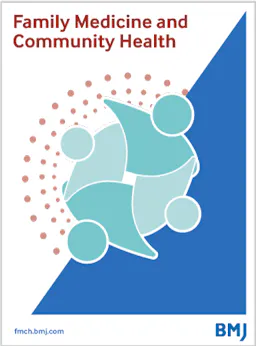Attitudes, beliefs, behaviours and perspectives on barriers and enablers of Australian general practitioners towards non-drug interventions: a national survey
IF 4.3
3区 医学
Q1 PRIMARY HEALTH CARE
引用次数: 0
Abstract
Background Many guidelines recommend non-drug interventions (NDIs) for managing common conditions in primary care. However, compared with drug interventions, NDIs are less widely known, promoted and used. We aim to (1) examine general practitioners’ (GPs’) knowledge, attitudes and practices for NDIs, including their use of the Royal Australian College of General Practitioners (RACGP) Handbook of Non-Drug Interventions (HANDI), and (2) identify factors influencing their use of NDIs and HANDI. Methods We conducted a web-based cross-sectional survey of practicing GP members in Australia during October–November 2022. The survey contained five sections: characteristics of GP; knowledge and use of NDIs; attitudes towards NDIs; barriers and enablers to using HANDI; and suggestions of NDIs and ideas to improve the uptake of NDIs in primary care. Results Of the 366 GPs who completed the survey, 242 (66%) were female, and 248 (74%) were ≥45 years old. One in three GPs reported that they regularly (‘always’) recommend NDIs to their patients when appropriate (34%), whereas one-third of GPs were unaware of HANDI (39%). GPs identified several factors that improve the uptake of HANDI, including ‘access and integration of HANDI in clinical practice’, ‘content and support to use in practice’ and ‘awareness and training’. Conclusions While many GPs are aware of the effectiveness of NDIs and often endorse their use, obstacles still prevent widespread adoption in primary care. The results of this survey can serve as a foundation for developing implementation strategies to improve the uptake of effective evidence-based NDIs in primary care. Data are available upon reasonable request. The authors had full access to all of the data in the study. Aggregated data that underlie the results reported in this article are available on request to the corresponding author.澳大利亚全科医生对非药物干预措施的态度、信念、行为以及对障碍和促进因素的看法:全国调查
背景 许多指南都建议采用非药物干预措施(NDI)来控制初级保健中的常见疾病。然而,与药物干预相比,非药物干预的知名度、推广和使用程度都较低。我们的目的是:(1)研究全科医生(GPs)对非药物干预的认识、态度和实践,包括他们对澳大利亚皇家全科医师学院(RACGP)非药物干预手册(HANDI)的使用情况;(2)确定影响他们使用非药物干预和HANDI的因素。方法 我们在 2022 年 10 月至 11 月期间对澳大利亚的执业全科医生会员进行了一次基于网络的横断面调查。调查包括五个部分:全科医生的特点;对无创伤药的了解和使用;对无创伤药的态度;使用 HANDI 的障碍和有利因素;以及对无创伤药的建议和提高无创伤药在初级保健中使用率的想法。结果 在完成调查的 366 名全科医生中,242 名(66%)为女性,248 名(74%)年龄≥45 岁。三分之一的全科医生表示,他们会定期("总是")在适当的时候向患者推荐无创诊断(34%),而三分之一的全科医生不知道有 HANDI(39%)。全科医生认为有几个因素可以提高 HANDI 的使用率,包括 "临床实践中 HANDI 的获取和整合"、"在实践中使用的内容和支持 "以及 "意识和培训"。结论 虽然许多全科医生都了解 NDI 的有效性,并经常赞同使用 NDI,但仍有一些障碍阻碍了 NDI 在基层医疗机构的广泛应用。这项调查的结果可作为制定实施策略的基础,以提高以证据为基础的有效 NDIs 在初级保健中的使用率。如有合理要求,可提供相关数据。作者可以完全访问研究中的所有数据。本文报告结果所依据的汇总数据可向通讯作者索取。
本文章由计算机程序翻译,如有差异,请以英文原文为准。
求助全文
约1分钟内获得全文
求助全文
来源期刊

Family Medicine and Community Health
PRIMARY HEALTH CARE-
CiteScore
9.70
自引率
0.00%
发文量
27
审稿时长
19 weeks
期刊介绍:
Family Medicine and Community Health (FMCH) is a peer-reviewed, open-access journal focusing on the topics of family medicine, general practice and community health. FMCH strives to be a leading international journal that promotes ‘Health Care for All’ through disseminating novel knowledge and best practices in primary care, family medicine, and community health. FMCH publishes original research, review, methodology, commentary, reflection, and case-study from the lens of population health. FMCH’s Asian Focus section features reports of family medicine development in the Asia-pacific region. FMCH aims to be an exemplary forum for the timely communication of medical knowledge and skills with the goal of promoting improved health care through the practice of family and community-based medicine globally. FMCH aims to serve a diverse audience including researchers, educators, policymakers and leaders of family medicine and community health. We also aim to provide content relevant for researchers working on population health, epidemiology, public policy, disease control and management, preventative medicine and disease burden. FMCH does not impose any article processing charges (APC) or submission charges.
 求助内容:
求助内容: 应助结果提醒方式:
应助结果提醒方式:


